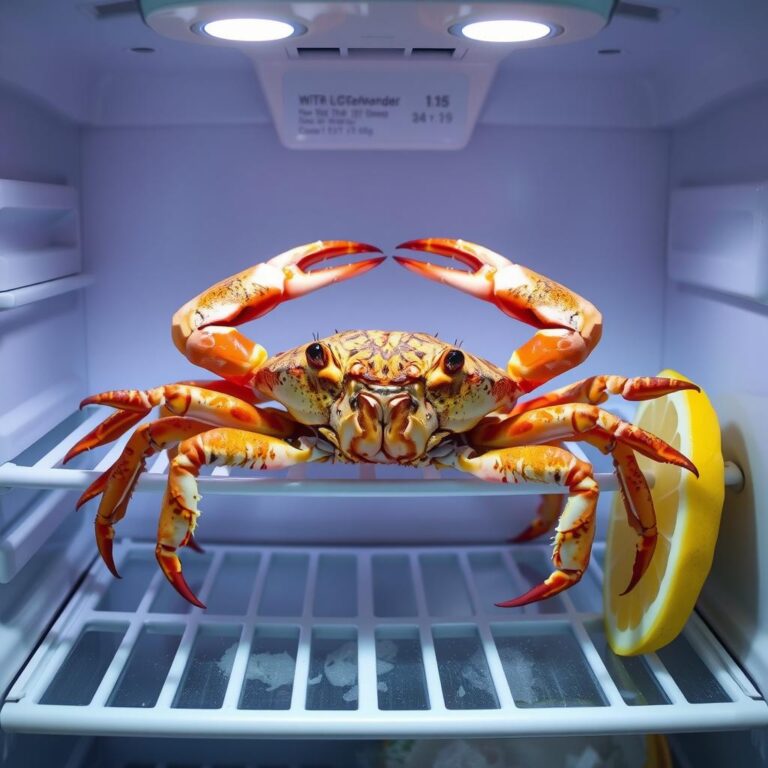Okay, let's dive into whether you can freeze cooked prime rib.
Can You Freeze Cooked Prime Rib? Let's Get Real.
So, you've got leftover prime rib, and you're wondering if you can stash it in the freezer.
The short answer? Yes, you can freeze cooked prime rib.
But, there’s a bit more to it if you want to maintain that delicious flavor and texture.
Nobody wants to ruin a perfectly good piece of prime rib, right?
Why Freeze Prime Rib?
Let’s be honest, prime rib is an investment.
It's not something you want to see go to waste.
Freezing cooked prime rib extends its shelf life, allowing you to enjoy it later without any guilt.
This is super useful if you cooked a large roast for a special occasion and have way more leftovers than you can eat in a few days.
Freezing prime rib is a fantastic solution for meal prepping.
Imagine pulling out perfectly portioned prime rib for quick weeknight dinners.
That's a win, no matter how you slice it.
Freezing Cooked Prime Rib: The Right Way.
Okay, so you’re on board with freezing.
Here's how to do it to keep your prime rib tasting great:
- Cool it Down: Let the cooked prime rib cool completely before freezing.
- Portion Control: Slice the prime rib into serving sizes. This makes thawing and reheating much easier.
- Wrap it Tight: Wrap each portion tightly in plastic wrap, ensuring minimal air exposure.
- Double Layer Defense: Add a layer of aluminum foil or place the wrapped prime rib in a freezer bag.
- Label and Date: Write the date on the bag so you know how long it's been in the freezer.
- Quick Freeze: Place the wrapped prime rib in the coldest part of your freezer for the fastest freeze.
These steps will minimize freezer burn and preserve the quality of your cooked prime rib.
Best Practices for Freezing Cooked Prime Rib
Here’s where things get a little more nuanced.
While freezing prime rib is straightforward, a few pro tips can make all the difference.
Consider vacuum sealing.
If you have a vacuum sealer, use it.
Vacuum sealing removes almost all the air, which is your enemy when it comes to freezer burn.
Think about freezing with the au jus.
Freezing slices of prime rib with a bit of the au jus can help maintain moisture and flavor.
How Long Can You Freeze Cooked Prime Rib?
For optimal quality, aim to use your frozen cooked prime rib within 2-3 months.
While it technically remains safe to eat longer, the texture and flavor will degrade over time.
Make a note to use it within that timeframe, and you’ll be golden.
Thawing Frozen Prime Rib: The Gentle Approach.
Thawing is just as important as freezing.
The goal is to thaw slowly and evenly to prevent any drastic changes in texture.
- Refrigerator Thawing: This is the safest and best method. Transfer the frozen prime rib to the refrigerator and let it thaw overnight or for about 24 hours, depending on the size of the portion.
- Cold Water Thawing: If you’re in a hurry, you can thaw the prime rib in cold water. Place the sealed bag in a bowl of cold water, changing the water every 30 minutes. This method takes a few hours.
Avoid thawing at room temperature, as this can promote bacterial growth.
Reheating Cooked Prime Rib after Freezing
Now, let’s talk about bringing your frozen prime rib back to life.
The key is to reheat it gently to prevent it from drying out.
- Oven Reheating: Preheat your oven to a low temperature (around 250°F). Place the thawed prime rib in a baking dish with a bit of beef broth or au jus. Cover the dish with foil and heat until warmed through, usually about 20-30 minutes.
- Sous Vide: If you have a sous vide machine, this is an excellent way to reheat prime rib. Set the temperature to around 130°F and cook the prime rib until it reaches your desired internal temperature.
- Pan Reheating: For smaller portions, you can reheat the prime rib in a skillet with a bit of butter or oil over medium-low heat.
Can Freezing Cooked Prime Rib Impact the Taste and Texture?
Here's the truth: freezing can slightly alter the texture of prime rib.
It might not be exactly the same as freshly cooked, but with the right freezing and thawing techniques, the difference should be minimal.
Proper wrapping and quick freezing will help preserve the taste and texture as much as possible.
Minimizing the Impact of Freezing
To keep your frozen prime rib as close to its original glory as possible:
- Freeze it as soon as possible after cooking and cooling.
- Use high-quality freezer bags or vacuum seal it.
- Avoid overcooking the prime rib in the first place, as freezing can further dry it out.
Now you know that you can freeze cooked prime rib, making meal prep easier!

Okay, let's dive into whether you can freeze cooked prime rib.
Can You Freeze Cooked Prime Rib? Let's Get Real.
So, you've got leftover prime rib, and you're wondering if you can stash it in the freezer.
The short answer? Yes, you can freeze cooked prime rib.
But, there’s a bit more to it if you want to maintain that delicious flavor and texture.
Nobody wants to ruin a perfectly good piece of prime rib, right?
Why Freeze Prime Rib?
Let’s be honest, prime rib is an investment.
It's not something you want to see go to waste.
Freezing cooked prime rib extends its shelf life, allowing you to enjoy it later without any guilt.
This is super useful if you cooked a large roast for a special occasion and have way more leftovers than you can eat in a few days.
Freezing prime rib is a fantastic solution for meal prepping.
Imagine pulling out perfectly portioned prime rib for quick weeknight dinners.
That's a win, no matter how you slice it.
Freezing Cooked Prime Rib: The Right Way.
Okay, so you’re on board with freezing.
Here's how to do it to keep your prime rib tasting great:
- Cool it Down: Let the cooked prime rib cool completely before freezing.
- Portion Control: Slice the prime rib into serving sizes. This makes thawing and reheating much easier.
- Wrap it Tight: Wrap each portion tightly in plastic wrap, ensuring minimal air exposure.
- Double Layer Defense: Add a layer of aluminum foil or place the wrapped prime rib in a freezer bag.
- Label and Date: Write the date on the bag so you know how long it's been in the freezer.
- Quick Freeze: Place the wrapped prime rib in the coldest part of your freezer for the fastest freeze.
These steps will minimize freezer burn and preserve the quality of your cooked prime rib.
Best Practices for Freezing Cooked Prime Rib
Here’s where things get a little more nuanced.
While freezing prime rib is straightforward, a few pro tips can make all the difference.
Consider vacuum sealing.
If you have a vacuum sealer, use it.
Vacuum sealing removes almost all the air, which is your enemy when it comes to freezer burn.
Think about freezing with the au jus.
Freezing slices of prime rib with a bit of the au jus can help maintain moisture and flavor.
How Long Can You Freeze Cooked Prime Rib?
For optimal quality, aim to use your frozen cooked prime rib within 2-3 months.
While it technically remains safe to eat longer, the texture and flavor will degrade over time.
Make a note to use it within that timeframe, and you’ll be golden.
Thawing Frozen Prime Rib: The Gentle Approach.
Thawing is just as important as freezing.
The goal is to thaw slowly and evenly to prevent any drastic changes in texture.
- Refrigerator Thawing: This is the safest and best method. Transfer the frozen prime rib to the refrigerator and let it thaw overnight or for about 24 hours, depending on the size of the portion.
- Cold Water Thawing: If you’re in a hurry, you can thaw the prime rib in cold water. Place the sealed bag in a bowl of cold water, changing the water every 30 minutes. This method takes a few hours.
Avoid thawing at room temperature, as this can promote bacterial growth.
Reheating Cooked Prime Rib after Freezing
Now, let’s talk about bringing your frozen prime rib back to life.
The key is to reheat it gently to prevent it from drying out.
- Oven Reheating: Preheat your oven to a low temperature (around 250°F). Place the thawed prime rib in a baking dish with a bit of beef broth or au jus. Cover the dish with foil and heat until warmed through, usually about 20-30 minutes.
- Sous Vide: If you have a sous vide machine, this is an excellent way to reheat prime rib. Set the temperature to around 130°F and cook the prime rib until it reaches your desired internal temperature.
- Pan Reheating: For smaller portions, you can reheat the prime rib in a skillet with a bit of butter or oil over medium-low heat.
Can Freezing Cooked Prime Rib Impact the Taste and Texture?
Here's the truth: freezing can slightly alter the texture of prime rib.
It might not be exactly the same as freshly cooked, but with the right freezing and thawing techniques, the difference should be minimal.
Proper wrapping and quick freezing will help preserve the taste and texture as much as possible.
Minimizing the Impact of Freezing
To keep your frozen prime rib as close to its original glory as possible:
- Freeze it as soon as possible after cooking and cooling.
- Use high-quality freezer bags or vacuum seal it.
- Avoid overcooking the prime rib in the first place, as freezing can further dry it out.
Now you know that you can freeze cooked prime rib, making meal prep easier!
Freezing cooked prime rib opens up a world of possibilities, but what about the nitty-gritty details?
Let’s tackle some common questions and concerns to ensure your prime rib stays fantastic, even after its deep freeze adventure.
Addressing Your Concerns About Freezing Prime Rib Leftovers
Worried about losing that rich, savory flavor when you freeze cooked prime rib?
You’re not alone.
Many folks stress about sacrificing taste for convenience.
But with the right techniques, you can have both.
Let’s dive into the common pitfalls and how to dodge them when you preserve cooked prime rib.
Maintaining Moisture When You Freeze Prime Rib
One of the biggest challenges of freezing any cooked meat, including prime rib, is moisture loss.
Nobody wants dry, crumbly prime rib after thawing.
So, how do you combat this?
- Au Jus is Your Friend: Before freezing, consider adding a spoonful or two of au jus (if you have it) to the wrapping. This helps keep the meat moist and infuses it with flavor during the freezing process.
- Vacuum Sealing is Key: If you've got a vacuum sealer, now's the time to shine. Vacuum sealing removes air, which can cause freezer burn and moisture loss.
- Double Wrapping: If you don't have a vacuum sealer, double wrapping with plastic wrap and then foil is your next best bet.
- Consider a Brine: Before cooking, brining the prime rib can help it retain moisture, which will also benefit it during freezing and reheating.
Preventing Freezer Burn on Frozen Prime Rib
Freezer burn is the arch-nemesis of frozen food.
It leads to dry, discolored patches that can ruin the taste and texture of your prime rib.
Here's how to keep it at bay:
- Wrap it Right: Ensure the prime rib is tightly wrapped with no exposed areas.
- Quick Freezing: Freezing quickly helps minimize ice crystal formation, which can damage the meat's cells and lead to freezer burn.
- Avoid Overcrowding: Don't overcrowd your freezer. This can slow down the freezing process.
- Use a Deep Freezer: If possible, use a deep freezer, as they maintain a more consistent and colder temperature than standard freezer compartments.
Maximizing Flavor Retention When Freezing Prime Rib
Taste is everything, right?
Here’s how to make sure your frozen prime rib is still a flavor bomb after thawing:
- Freeze High-Quality Prime Rib: Starting with a high-quality cut of meat is crucial. The better the prime rib, the better it will hold up in the freezer.
- Don't Freeze Old Leftovers: Freeze the prime rib as soon as possible after cooking and cooling. Don't let it sit in the fridge for days before freezing.
- Consider the Seasoning: The flavors of your seasonings can intensify during freezing, so be mindful of what you use.
- Marinade Before Freezing: Marinating the prime rib before cooking and freezing can help enhance flavor retention.
Reheating Techniques to Preserve the Quality of Your Cooked Prime Rib
The reheating process is crucial for bringing your frozen prime rib back to life.
Gentle reheating is the name of the game.
- Low and Slow: Reheat at a low temperature to avoid drying out the meat.
- Use Moisture: Add beef broth or au jus to the baking dish during reheating.
- Cover with Foil: Covering the prime rib with foil helps trap moisture.
- Avoid Microwaving: Microwaving can lead to uneven heating and a rubbery texture, so it's best to avoid it.
Creative Ways to Use Frozen Cooked Prime Rib
Okay, so you’ve thawed your frozen prime rib.
Now what?
Don’t just reheat it as is (unless that’s your thing).
Let's get creative:
- Prime Rib Sandwiches: Thinly sliced prime rib on crusty bread with horseradish sauce.
- Prime Rib Tacos: Use diced prime rib as a filling for tacos with your favorite toppings.
- Prime Rib Hash: Dice the prime rib and mix it with potatoes, onions, and peppers for a hearty hash.
- Prime Rib Stroganoff: Add sliced prime rib to a creamy mushroom stroganoff sauce and serve over noodles.
- Prime Rib Salad: Top a fresh salad with slices of prime rib for a protein-packed meal.
FAQs About Freezing Cooked Prime Rib
Got more questions?
I've got answers.
Here are some frequently asked questions about freezing cooked prime rib to clear up any lingering doubts:
Q: Can you freeze cooked prime rib roast?
A: Yes, you can freeze a cooked prime rib roast, but slice it into portions first for easier thawing and reheating.
Q: Is it better to freeze prime rib sliced or whole?
A: It's generally better to freeze prime rib sliced. This allows for easier portion control and faster thawing.
Q: How do you keep prime rib from drying out when freezing?
A: Use moisture-retaining techniques like vacuum sealing, adding au jus, and double wrapping.
Q: How long does frozen cooked prime rib last?
A: For optimal quality, aim to use your frozen cooked prime rib within 2-3 months.
Q: Can I refreeze prime rib after thawing?
A: It's generally not recommended to refreeze prime rib after thawing, as this can degrade the quality and increase the risk of bacterial growth.
Q: What's the best way to thaw prime rib?
A: The best way to thaw prime rib is in the refrigerator overnight.
Q: How do I reheat prime rib without drying it out?
A: Reheat at a low temperature in the oven with added moisture and covered with foil.
Conclusion
So, can you freeze cooked prime rib? Absolutely.
With the right techniques, you can preserve that delicious flavor and texture, making meal prep a breeze and avoiding food waste.
Follow these tips, and you'll be enjoying prime rib long after the special occasion is over and make sure you enjoy freezing cooked prime rib!


